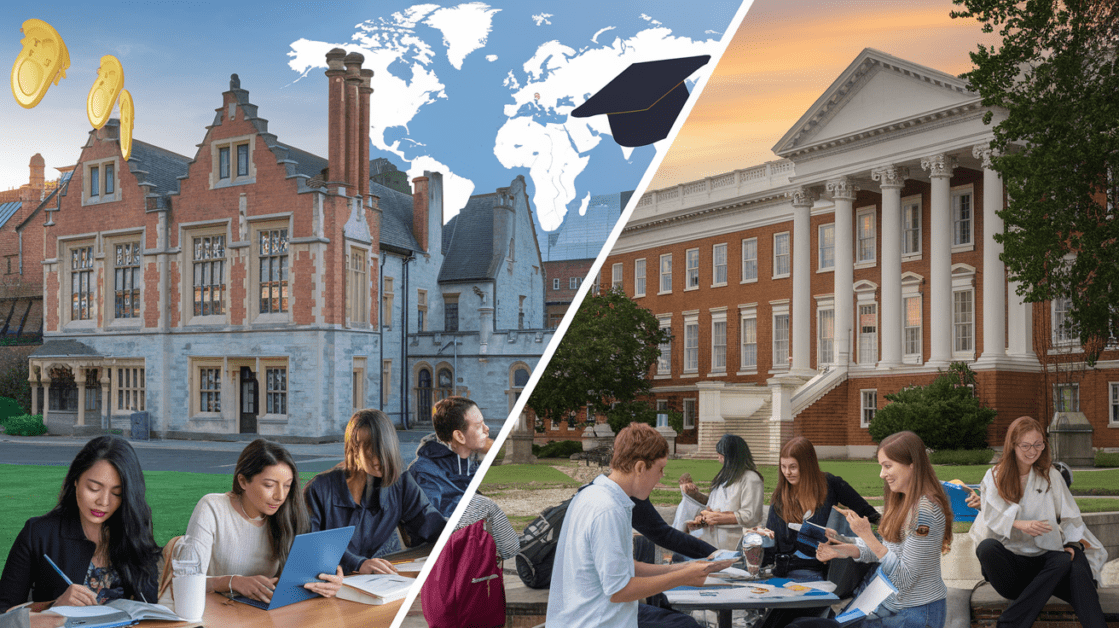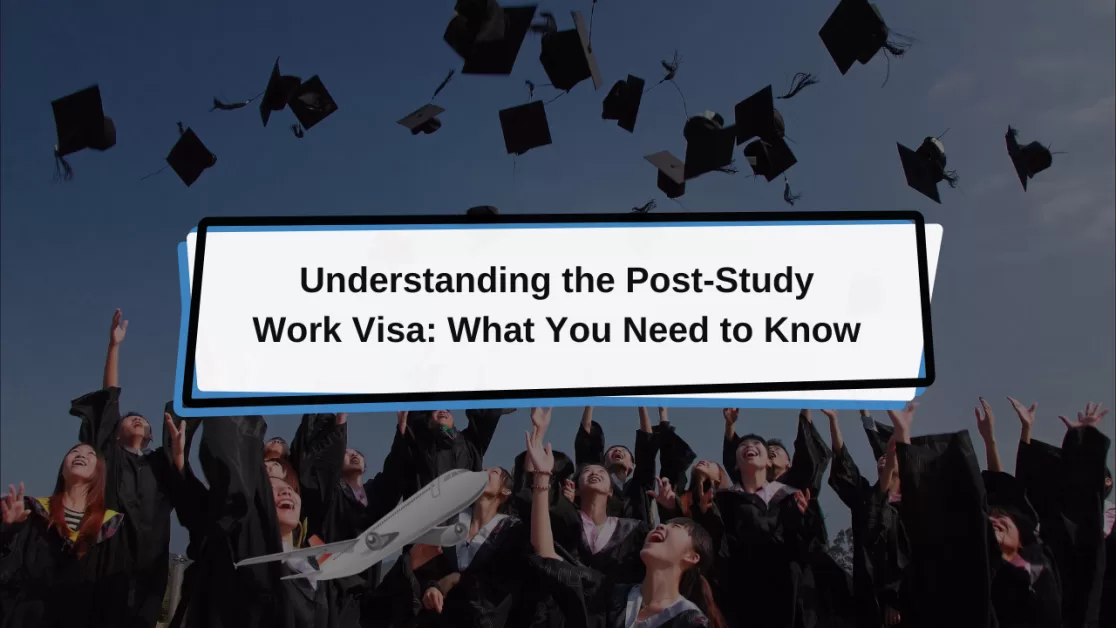
Stepping into the global job market after graduation can be an exhilarating yet daunting experience. For international students, the prospect of staying in their host country to gain valuable work experience is often a top priority. Enter the Post-Study Work Visa – a gateway to exciting career opportunities and professional growth.
But navigating the complexities of immigration policies can feel like solving a Rubik’s cube blindfolded. What exactly is a Post-Study Work Visa? Who’s eligible? How do you apply? These questions and more swirl in the minds of ambitious graduates eager to kickstart their international careers. Don’t let uncertainty hold you back from your dreams! This comprehensive guide will demystify the Post-Study Work Visa process, equipping you with the knowledge to make informed decisions about your future. From eligibility criteria to application procedures, we’ll explore everything you need to know to transition smoothly from student to skilled professional in your chosen field.
Table of Contents
What is a Post-Study Work Visa?
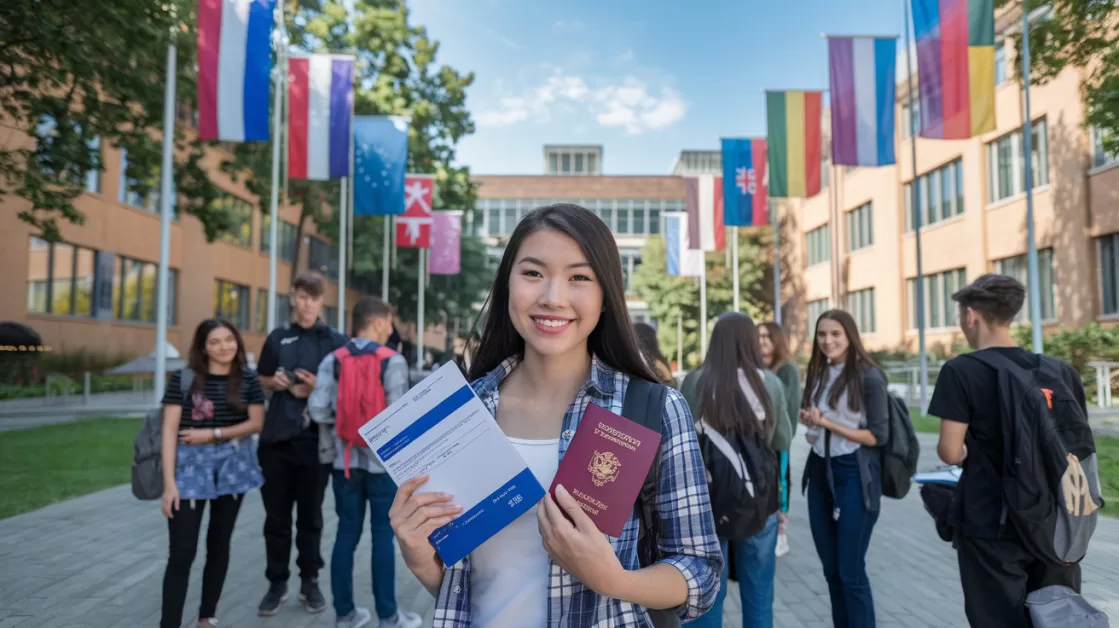
Definition and purpose
A Post-Study Work Visa is a specialized immigration document that allows international students to remain in the host country after completing their studies. Its primary purpose is to provide graduates with an opportunity to gain valuable work experience in their field of study, apply their newly acquired skills, and potentially transition into long-term employment or permanent residency.
Countries offering this visa
Several countries offer Post-Study Work Visas to attract and retain international talent. Here’s a comparison of some popular destinations:
Country | Visa Name | Duration |
|---|---|---|
UK | Graduate Route | 2 years (3 years for PhD graduates) |
Canada | Post-Graduation Work Permit | Up to 3 years |
Australia | Temporary Graduate Visa | 2-4 years |
New Zealand | Post-Study Work Visa | 1-3 years |
Germany | Job Seeker Visa | 18 months |
Key benefits for international students
Post-Study Work Visas offer numerous advantages to international graduates:
Gain practical work experience in a global setting
Enhance employability and career prospects
Potential pathway to permanent residency
Opportunity to earn and repay student loans
Develop professional networks in the host country
Improve language skills in a professional context
These visas bridge the gap between academic achievement and professional success, providing a valuable stepping stone for international students transitioning into the global workforce.
Eligibility Criteria
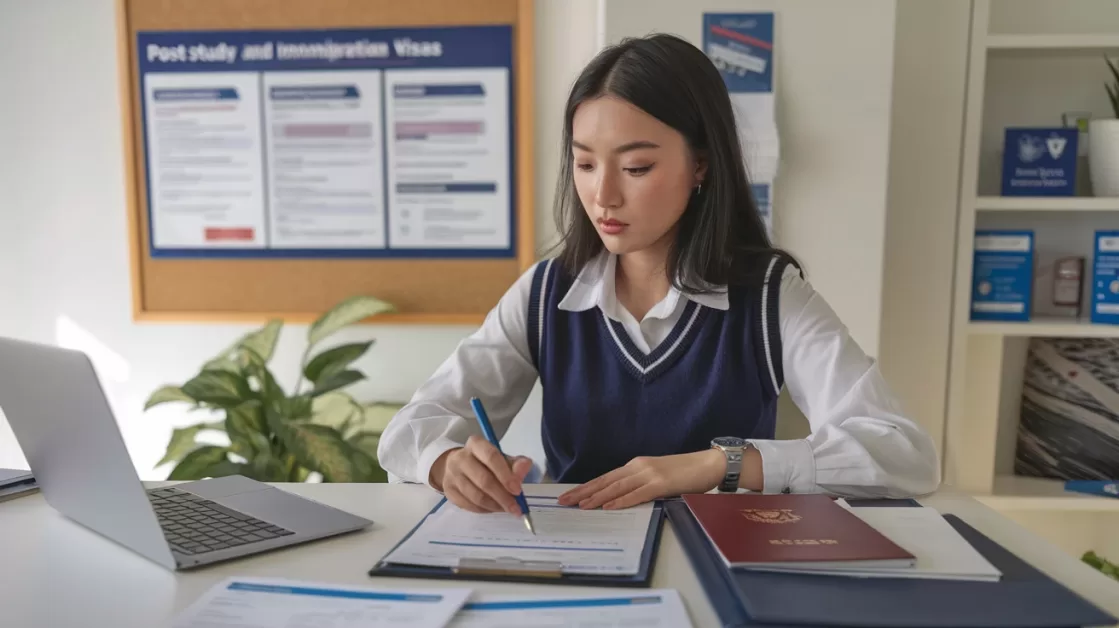
Now that we understand what a Post-Study Work Visa is, let’s delve into the eligibility criteria. Meeting these requirements is crucial for international graduates seeking to work in the UK after completing their studies.
A. Educational qualifications required
To be eligible for a Post-Study Work Visa, applicants must have completed a qualifying degree from a recognized UK institution. The following table outlines the different types of degrees and their corresponding visa durations:
Degree Level | Visa Duration |
|---|---|
Bachelor’s or Master’s | 2 years |
PhD | 3 years |
B. Language proficiency requirements
Demonstrating English language proficiency is essential for Post-Study Work Visa applicants. Most applicants satisfy this requirement through their studies, as UK universities typically have English language standards for admission. However, some may need to provide additional proof, such as:
IELTS (International English Language Testing System) scores
TOEFL (Test of English as a Foreign Language) results
Other recognized English language qualifications
C. Time limits after graduation
Timing is critical when applying for a Post-Study Work Visa. Applicants must:
Apply within 2 years of completing their degree
Be in the UK at the time of application
Have a valid student visa or other eligible immigration status
D. Financial considerations
While the Post-Study Work Visa doesn’t have a specific financial requirement, applicants should consider:
Visa application fees
Immigration Health Surcharge costs
Proof of sufficient funds to support themselves during their stay
It’s important to note that these criteria may vary depending on individual circumstances and any changes in UK immigration policies. As we move forward, we’ll explore the application process for those who meet these eligibility requirements.
Application Process

Now that we’ve covered the eligibility criteria, let’s delve into the application process for the Post-Study Work Visa. Understanding this process is crucial for a successful application.
A. Required Documents
To apply for a Post-Study Work Visa, you’ll need to prepare the following documents:
Valid passport
Proof of successful course completion
Confirmation of Acceptance for Studies (CAS)
English language proficiency evidence
Proof of financial means
B. Application Fees
The costs associated with the Post-Study Work Visa application are as follows:
Fee Type | Amount |
|---|---|
Application Fee | Based on country. |
C. Processing Times
The processing time for a Post-Study Work Visa application typically ranges from 2 to 8 weeks. However, this can vary based on individual circumstances and application volume.
D. Common Pitfalls to Avoid
When applying for a Post-Study Work Visa, be mindful of these common mistakes:
Submitting incomplete documentation
Missing application deadlines
Providing incorrect information
Failing to meet financial requirements
Overlooking health and character requirements
By carefully following the application guidelines and avoiding these pitfalls, you can increase your chances of a successful Post-Study Work Visa application. Next, we’ll examine the rights and restrictions associated with this visa.
Rights and Restrictions
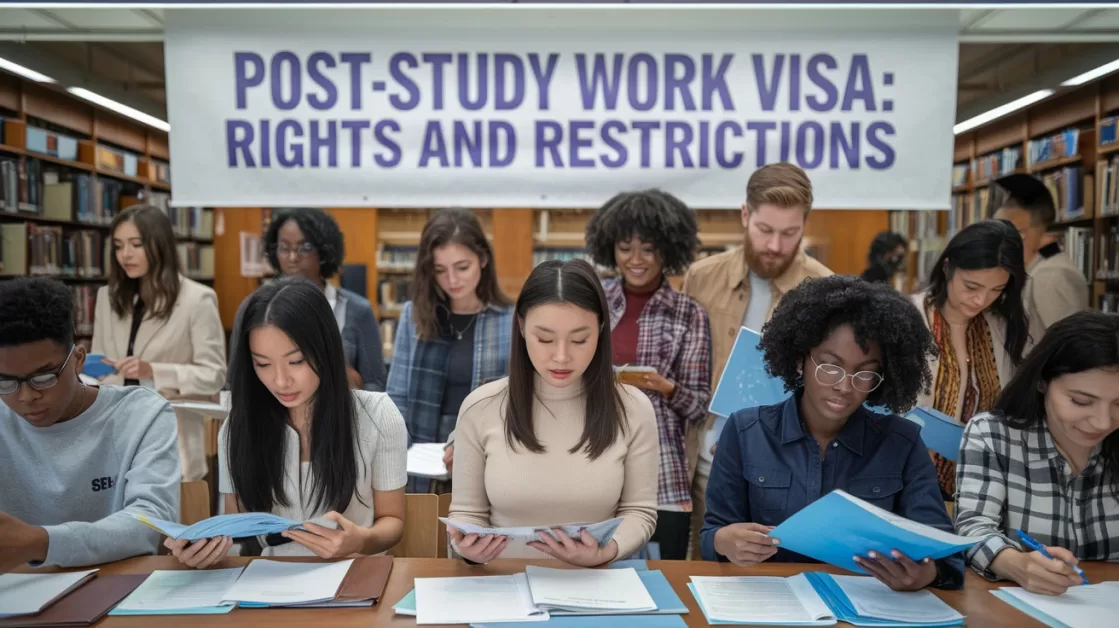
Now that we’ve covered the application process, let’s explore the rights and restrictions associated with a Post-Study Work Visa. Understanding these aspects is crucial for international graduates planning their future in the UK.
A. Employment opportunities
Post-Study Work Visa holders enjoy significant employment flexibility:
Work in any sector or position
Switch jobs without additional permission
Start a business or work as self-employed
Benefit | Description |
|---|---|
Job Flexibility | Freedom to work in any field |
Entrepreneurship | Ability to start a business |
Self-Employment | Option to work independently |
B. Duration of stay
The duration of a Post-Study Work Visa varies based on the level of study:
Bachelor’s or Master’s degree graduates: 2 years
PhD graduates: 3 years
C. Travel limitations
While on a Post-Study Work Visa:
Travel in and out of the UK is generally unrestricted
Extended absences may affect future immigration applications
Visa holders should maintain their primary residence in the UK
D. Path to permanent residency
The Post-Study Work Visa can serve as a stepping stone towards permanent residency:
Gain valuable work experience
Build professional networks
Transition to other work visas (e.g., Skilled Worker Visa)
Accumulate time towards the 5-year residency requirement
Next, we’ll explore how to prepare effectively for post-study work opportunities in the UK.
Preparing for Post-Study Work

Now that we’ve covered the application process and rights associated with a post-study work visa, let’s focus on how to prepare for your post-study work experience.
Building a Professional Network
Networking is crucial for finding job opportunities and advancing your career. Here are some effective strategies:- Attend industry events and career fairsThe Best Times to Buy a Car
- Join professional associations related to your field
- Utilize LinkedIn to connect with alumni and professionals
- Participate in university networking events
Gaining Relevant Work Experience
Work experience can set you apart in a competitive job market. Consider these options:- Internships or part-time jobs during your studies
- Volunteer work related to your field
- Collaborative projects with local businesses
- Participating in research initiatives
Developing In-Demand Skills
To increase your employability, focus on acquiring skills that are highly sought after:| Skill Category | Examples |
|---|---|
| Technical Skills | Programming, data analysis, digital marketing |
| Soft Skills | Communication, leadership, problem-solving |
| Language Skills | Proficiency in local language and business English |
| Industry-Specific Skills | Relevant certifications or specialized knowledge |
Understanding Local Job Market Trends
Stay informed about the job market to target your efforts effectively:- Research growing industries in your chosen location
- Follow local business news and economic reports
- Attend job market seminars or webinars
- Consult with career advisors at your university
Alternatives to Post-Study Work Visas
Now that we’ve explored the Post-Study Work Visa, let’s consider alternative options for international graduates who may not be eligible or choose not to pursue this route.
A. Other visa options for graduates
For those seeking alternatives to the Post-Study Work Visa, several options are available:
Skilled Worker Visa
Start-up Visa
Innovator Visa
Global Talent Visa
Visa Type | Key Features | Eligibility |
|---|---|---|
Skilled Worker | Sponsored job offer required | Job offer in a skilled occupation, salary threshold |
Start-up | For entrepreneurs with innovative business ideas | Endorsement from approved body, viable business plan |
Innovator | For experienced businesspeople | £50,000 investment funds, innovative business idea |
Global Talent | For leaders in academia, research, arts, or digital technology | Endorsement in field of expertise |
B. Returning home and applying skills
Returning to one’s home country can offer unique opportunities:
Utilize international education to stand out in the local job market
Apply cross-cultural experiences to multinational companies
Start a business leveraging global connections
Contribute to the development of your home country’s economy
C. Further education opportunities
Pursuing additional education can enhance career prospects:
Master’s or PhD programs
Professional certifications
Online courses and MOOCs
Research fellowships
These alternatives provide diverse pathways for international graduates to advance their careers, whether by exploring different visa options, returning home with valuable skills, or furthering their education.
Conclusion
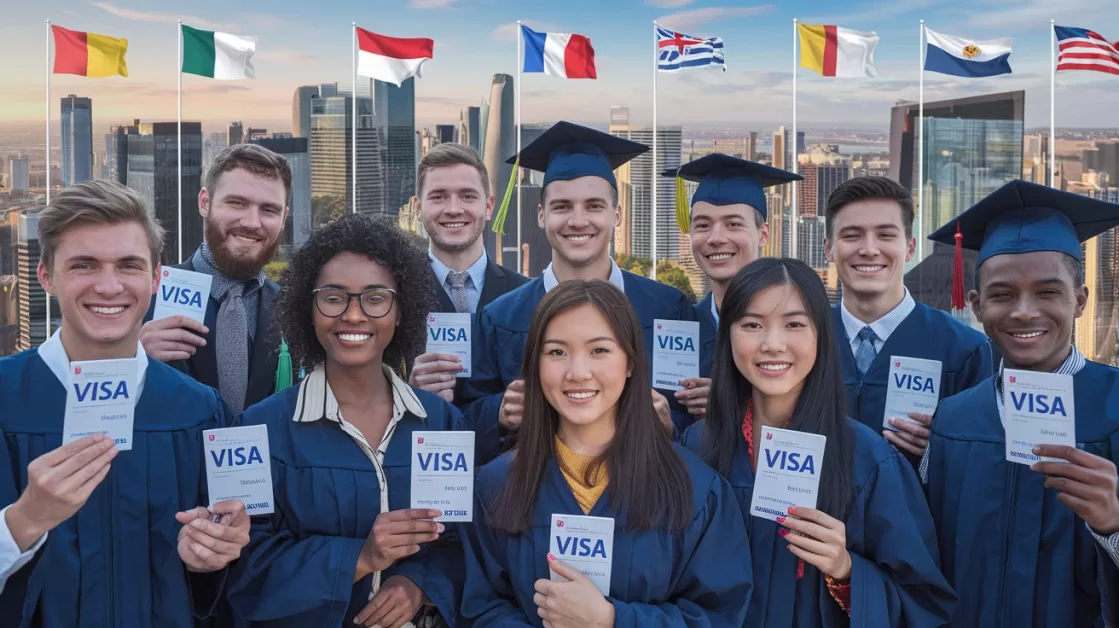
The Post-Study Work Visa offers international students a valuable opportunity to gain practical experience and potentially kickstart their careers in their country of study. By understanding the eligibility criteria, application process, and associated rights and restrictions, students can make informed decisions about their post-graduation plans. Proper preparation, including researching job markets and networking, is crucial for maximizing the benefits of this visa option.
While the Post-Study Work Visa presents an attractive path for many graduates, it’s essential to consider alternative options as well. These may include pursuing further education, exploring entrepreneurship opportunities, or investigating other visa categories that align with individual career goals. Ultimately, the key to success lies in carefully evaluating all available options and choosing the path that best supports long-term personal and professional aspirations.
Ready to explore? Start your visa application today and get one step closer to your adventure!
Don’t let uncertainties hold you back. Our team of expert overseas education consultants is readily available to assist you. Whether you have inquiries about:
- Specific document requirements
- Interview preparation tips
- Visa application timelines
We’re ready to provide personalized guidance tailored to your unique situation. Get in Touch Today at: +919041818122 and begin your journey with Vrinda International.
The information provided in this blog is for general guidance purposes only. Visa policies, application procedures, and fees or any other details are subject to change without prior notice. For the most accurate and up-to-date details, we recommend contacting us directly or consulting official sources. Feel free to reach out to us for personalized assistance with your visa application or travel needs.
FAQ - Frequently Asked Question
What is a Post-Study Work Visa?
- A Post-Study Work Visa allows international students to stay in the country where they studied and work after completing their degree. It provides graduates with the opportunity to gain work experience in their field of study.
Which countries offer Post-Study Work Visas for international students?
- Many countries offer Post-Study Work Visas, including the UK, USA, Canada, Australia, New Zealand, Germany, and Ireland, among others.
What are the general eligibility criteria for a Post-Study Work Visa?
- Eligibility typically requires you to have completed a recognized degree from a higher education institution in the country where you’re applying, and you must hold a valid student visa at the time of application.
How long can I stay on a Post-Study Work Visa?
- The length of stay varies by country:
- UK: 2 years (3 years for PhD graduates)
- USA: Up to 12 months for most degrees, 24 months for STEM graduates (under the OPT program)
- Canada: Up to 3 years, depending on the program of study
- Australia: 2-4 years, depending on the level of qualification
- New Zealand: 1-3 years, depending on qualification and location
- Germany: 18 months
Do I need a job offer to apply for a Post-Study Work Visa?
- In most cases, you do not need a job offer to apply for a Post-Study Work Visa. These visas are designed to allow you to look for work in your field after graduation.
What are the benefits of a Post-Study Work Visa?
- A Post-Study Work Visa allows you to gain work experience, build your professional network, and potentially transition to a long-term or permanent visa. It’s a pathway for starting your career in the country where you studied.
Can I apply for permanent residency after my Post-Study Work Visa expires?
- Many countries allow graduates on a Post-Study Work Visa to transition to a Skilled Worker Visa or apply for permanent residency if they meet specific criteria, such as securing a qualifying job or meeting residency requirements.
What is the application process for a Post-Study Work Visa?
- The process typically involves:
- Completing an online application
- Submitting proof of graduation from an accredited institution
- Providing passport and visa details
- Paying the visa application fee
- In some cases, proving financial stability or purchasing health insurance (depending on the country).
How much does it cost to apply for a Post-Study Work Visa?
- Costs vary by country:
- UK: Around £715 plus an Immigration Health Surcharge
- USA: $410 for OPT application
- Canada: CAD $255 for the Post-Graduation Work Permit
- Australia: AUD $1,680 for the Temporary Graduate Visa
- New Zealand: NZD $495 for the Post-Study Work Visa
Can I extend my Post-Study Work Visa?
- In most countries, the Post-Study Work Visa cannot be extended. However, you may be able to switch to another visa category, such as a Skilled Worker Visa, if you secure a job offer or meet specific qualifications.
Can I bring dependents on a Post-Study Work Visa?
- Some countries allow dependents (spouse/partner and children) to stay or join you on your Post-Study Work Visa, but the rules vary. For example:
- UK: Dependents are allowed if they were already in the UK on your Student Visa.
- Australia: Dependents can be included in your application.
- USA: Dependents are generally not allowed on OPT.
Can I work in any job while on a Post-Study Work Visa?
- Yes, in most countries, there are no restrictions on the type of work you can do while on a Post-Study Work Visa. You can work full-time, part-time, or even freelance.
Can I travel outside the country while on a Post-Study Work Visa?
- Yes, most Post-Study Work Visas allow for international travel, but you must ensure your visa remains valid and you comply with the re-entry requirements of the country you are in.
What happens if I cannot find a job while on a Post-Study Work Visa?
- If you are unable to find employment during the validity of your Post-Study Work Visa, you will typically need to leave the country once the visa expires, unless you qualify for another visa category.
When should I apply for a Post-Study Work Visa?
- You should apply after completing your course and receiving your final results but before your Student Visa expires. The timing may vary depending on the country’s specific rules.
Is there a limit to how many times I can apply for a Post-Study Work Visa?
- Generally, you can only apply for a Post-Study Work Visa once per country. If you return for another degree, you may not be eligible for a second Post-Study Work Visa, depending on the country’s rules.

